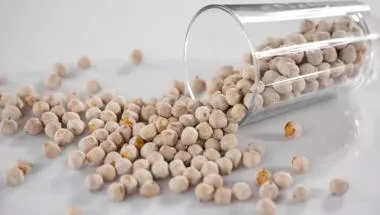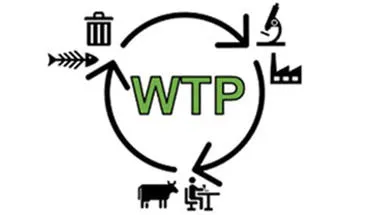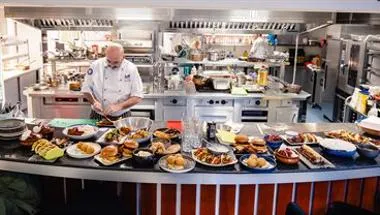This Research Interest Group on Safe and Sustainable Diets for a Healthy Body And Mind provides a unique opportunity for the King’s research community to address the challenges of safe and sustainable diets across a range of health outcomes. Bringing together collective expertise across Faculties, Centres and Schools, we have identified three key themes:
- Optimising the innovation, development and uptake of safe and sustainable diets;
- Advancing the integration of nutritional science across Health Schools to improve prevention and management of disease, translating research into practical interventions that meet climate and sustainability goals and benefit patients and wider society;
- Strengthening expertise and competence in monitoring and modifying dietary behaviours across the College.
Microsoft Teams Chat
For colleagues within King's there is a Microsoft Chat for this group. Please apply here to join the chat. (Internal Link)
Projects

Developing novel food ingredients from pulses to enhance nutritional quality of foods.
Work at King’s in collaboration with colleagues at Quadram Institute and Novel Food Innovation has led to the development of a novel whole cell pulse flour ingredient for inclusion in foods. Recent work published in The American Journal of Clinical Nutrition has shown that partial replacement of regular wheat flour with cellular chickpea flour in bread improves glycaemic and insulinaemic responses. Bread containing the cellular pulse flour also stimulated the release of satiety-promoting gut hormones, GIP-1 and PYY. This collaboration has led to the development of new methods in food technology that allow the cell walls (i.e. dietary fibre) of the starch-rich pulse cells to be preserved during mechanical and hydrothermal processing. This raises the possibility of producing a range of foods enriched with this high-fibre cellular pulse flour that will have beneficial nutritional qualities for improved health.

Reducing food waste by developing waste-to-protein technologies.
Each year in the UK 1.5 million tonnes of organic waste is created from the production of food. Furthermore, 1.3bn tonnes of wasted food and 11.1 bn tonnes of crop residues such as wheat straw are produced annually. A collaboration between researchers in the Faculty of Natural, Mathematical & Engineering Sciences and the Faculty of Life Sciences & Medicine published in Green Chemistry has identified ways in which this waste could be converted into protein. Potentially these processes could generate sufficient protein to meet to requirements of every adult in the world. Ongoing work with industry is developing protein from lignocellulosic material. Work is also in place to increase public awareness of the potential benefits waste-to-protein technology.

King’s Food Living Laboratory
King’s Food are UK leaders in Higher Education Catering sustainability. Since 2019 King’s Food have worked with the Department of Nutritional Sciences to develop student research projects that bring together food, health and sustainability. As part of a King's Education for Sustainability project we are looking to expand student research opportunities across King’s. We are piloting the King’s Food Living Laboratory concept for final year MSc projects (academic year 2025/26).
Projects

Developing novel food ingredients from pulses to enhance nutritional quality of foods.
Work at King’s in collaboration with colleagues at Quadram Institute and Novel Food Innovation has led to the development of a novel whole cell pulse flour ingredient for inclusion in foods. Recent work published in The American Journal of Clinical Nutrition has shown that partial replacement of regular wheat flour with cellular chickpea flour in bread improves glycaemic and insulinaemic responses. Bread containing the cellular pulse flour also stimulated the release of satiety-promoting gut hormones, GIP-1 and PYY. This collaboration has led to the development of new methods in food technology that allow the cell walls (i.e. dietary fibre) of the starch-rich pulse cells to be preserved during mechanical and hydrothermal processing. This raises the possibility of producing a range of foods enriched with this high-fibre cellular pulse flour that will have beneficial nutritional qualities for improved health.

Reducing food waste by developing waste-to-protein technologies.
Each year in the UK 1.5 million tonnes of organic waste is created from the production of food. Furthermore, 1.3bn tonnes of wasted food and 11.1 bn tonnes of crop residues such as wheat straw are produced annually. A collaboration between researchers in the Faculty of Natural, Mathematical & Engineering Sciences and the Faculty of Life Sciences & Medicine published in Green Chemistry has identified ways in which this waste could be converted into protein. Potentially these processes could generate sufficient protein to meet to requirements of every adult in the world. Ongoing work with industry is developing protein from lignocellulosic material. Work is also in place to increase public awareness of the potential benefits waste-to-protein technology.

King’s Food Living Laboratory
King’s Food are UK leaders in Higher Education Catering sustainability. Since 2019 King’s Food have worked with the Department of Nutritional Sciences to develop student research projects that bring together food, health and sustainability. As part of a King's Education for Sustainability project we are looking to expand student research opportunities across King’s. We are piloting the King’s Food Living Laboratory concept for final year MSc projects (academic year 2025/26).
Group leads
Contact us
Please follow us on our LinkedIn Group
Please join our Microsoft Teams channel









